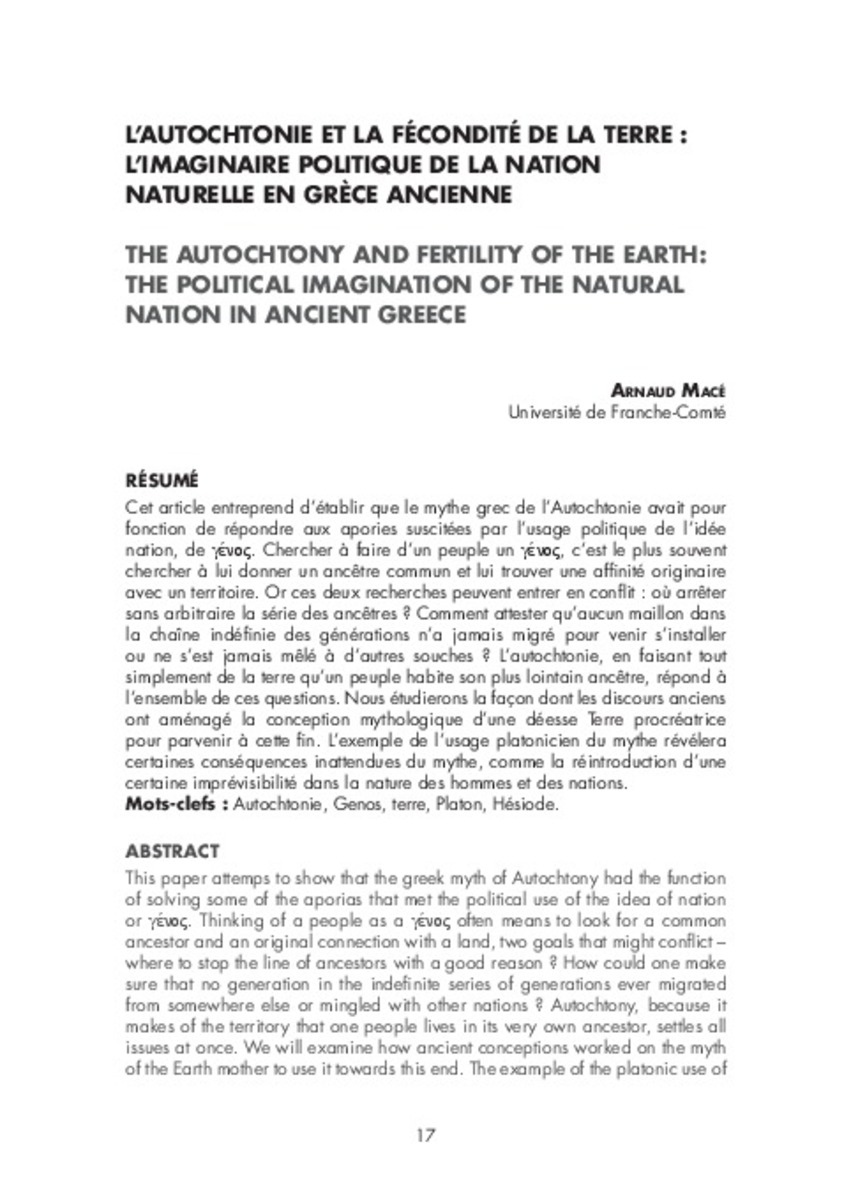Mostrar el registro sencillo del ítem
L’autochtonie et la fécondité de la terre: l’imaginaire politique de la nation naturelle en grèce ancienne
| dc.contributor.author | Macé, Arnaud | |
| dc.date.accessioned | 2018-11-29T08:08:48Z | |
| dc.date.available | 2018-11-29T08:08:48Z | |
| dc.date.issued | 2018 | |
| dc.identifier.citation | MACÉ, Arnaud. L’autochtonie et la fécondité de la terre: l’imaginaire politique de la nation naturelle en grèce ancienne. Millars. Espai i Història, 2018, vol. 26, no 44, p. 17-44 | ca_CA |
| dc.identifier.issn | 1132-9823 | |
| dc.identifier.issn | 2340-4809 | |
| dc.identifier.uri | http://hdl.handle.net/10234/177751 | |
| dc.description.abstract | Cet article entreprend d'établir que le mythe grec de l'Autochtonie avait pour fonction de répondre aux apories suscitées par l'usage politique de l'idée nation, de γένος. Chercher à faire d'un peuple un γένος, le plus souvent chercher à lui donner un ancêtre commun et lui trouver une affinité originaire avec un territoire. Or ces deux recherches peuvent entrer en conflit : où arrêter sans arbitraire la série des ancêtres? Comment attester qu'aucun maillon dans la chaîne indéfinie des générations n'a jamais migré pour venir s' installer ou ne s'est jamais mêlé à d'autres souches ? L'autochtonie, en faisant tout simplement de la terre qu'un peuple habite son plus lointain ancêtre, répond à l'ensemble de ces questions. Nous étudierons la façon dont les discours anciens ont aménagé la conception mythologique d'une déesse Terre procréatrice pour parvenir à cette fin . L'exemple de l'usage platonicien du mythe révélera certaines conséquences inattendues du mythe, comme la réintroduction d'une certaine imprévisibilité dans la nature des hommes et des nations. | ca_CA |
| dc.description.abstract | This paper attemps to show that the greek myth of Autochtony had the function of solving sorne of the aporias that met the political use of the idea of nation or γένος;. Thinking of a people as a γένος; often means to look for a common ancestor and an original connection with a land, two goals that might conflict - where to stop the line of ancestors with a good reason ? How could one make sure that no generation in the indefinite series of generations ever migrated from somewhere else or mingled with other nations ? Autochtony, because it makes of the territory that one people lives in its very own ancestor, settles all issues at once. We will examine how ancient conceptions worked on the myth of the Earth mother to use it towards this end. The example of the platonic use of this myth will also show unexpected consequences, including the reintroduction of some impredictibility within the nature of man and of nations. | ca_CA |
| dc.description.abstract | Aquest article tracta d' establir que el mite grec de I' Autoctonia tenia la funció de donar resposta a les apories suscitades per l'ús polític de la idea de la nació, γένος:,. Per intentar fer d'un poble un γένος, el més sovint es tractar de donar- li un avantpassat comú i trabar-lo amb una afinitat original amb un territori . Ara bé, aquestes dues vies poden entrar en conflicte: on ficar fi sense ser arbitraris la serie d'avantpassats? Com donar fe de que cap vincle en la cadena indefinida de generacions mai ha emigrat per establir-se o haver-se barrejat amb altres ceps? L'autoctonia, simplement fent que la terra siga una població on ha habitat el seu avantpassat més llunyà, respon a totes aquestes preguntes. Anem a analitzar com els discursos antics han exposat la concepció mitologica d'una deessa procreativa per aconseguir aquest fi . L'exemple de l'ús platonic del mite revelarà certes conseqüències inesperades del mite, com la reintroducció d'una certa imprevisibilitat en la naturalesa deis homes i les nacions. | ca_CA |
| dc.format.extent | 27 p. | ca_CA |
| dc.format.mimetype | application/pdf | ca_CA |
| dc.language.iso | fra | ca_CA |
| dc.publisher | Publicacions de la Universitat Jaume I | ca_CA |
| dc.relation.isPartOf | Millars: Espai i historia, 2018, vol. 44, núm. 1 | ca_CA |
| dc.rights | Atribución-CompartirIgual 4.0 Internacional | * |
| dc.rights.uri | http://creativecommons.org/licenses/by-sa/4.0/ | * |
| dc.subject | autochtonie | ca_CA |
| dc.subject | Genos | ca_CA |
| dc.subject | terre | ca_CA |
| dc.subject | Platon | ca_CA |
| dc.subject | Hésiode | ca_CA |
| dc.subject | autochtony | ca_CA |
| dc.subject | earth | ca_CA |
| dc.subject | Plato | ca_CA |
| dc.subject | Hesiod | ca_CA |
| dc.subject | autoctonia | ca_CA |
| dc.subject | Gènus | ca_CA |
| dc.subject | terra | ca_CA |
| dc.subject | Plató | ca_CA |
| dc.subject | Hesíode | ca_CA |
| dc.title | L’autochtonie et la fécondité de la terre: l’imaginaire politique de la nation naturelle en grèce ancienne | ca_CA |
| dc.title.alternative | The Autochtony and Fertility of the Earth: The Political Imagination of the Natural Nation in Ancient Greece | ca_CA |
| dc.title.alternative | L'Autoctonia i la fecunditat de la terra: l'imaginari polític de la nació natural a la Grècia antiga | ca_CA |
| dc.type | info:eu-repo/semantics/article | ca_CA |
| dc.identifier.doi | http://dx.doi.org/10.6035/Millars.2018.44.2 | |
| dc.rights.accessRights | info:eu-repo/semantics/openAccess | ca_CA |
| dc.relation.publisherVersion | http://www.e-revistes.uji.es/index.php/millars/article/view/3437 | ca_CA |
Ficheros en el ítem
Este ítem aparece en la(s) siguiente(s) colección(ones)
-
Millars: espai i història_2018_núm.44 [9]
Pensar la nación








